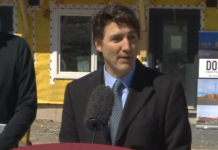PRIME Minister Justin Trudeau on Tuesday announced progress under Canada’s Plan to Mobilize Industry to fight COVID-19, which increases Canada’s ability to respond to the outbreak with necessary medical equipment and supplies.
The federal government is investing $2 billion to support diagnostic testing and to purchase ventilators and protective personal equipment, including for bulk purchases with provinces and territories. Personal protective equipment includes things like more masks and face shields, gowns, and hand sanitizer.
On March 20, the government called on Canadian businesses and manufacturers to help deliver critical health supplies. Since then, the government has spoken directly with almost 3,000 Canadian companies that have offered their expertise and capacity to meet the country’s need for personal protective equipment and critical health supplies.
The government has signed new procurement agreements with Canadian companies Thornhill Medical, Medicom, and Spartan Bioscience to purchase and boost capacity to manufacture equipment and supplies including portable ventilators, surgical masks, and rapid testing kits. The government has ordered millions of supplies to ease the pressure on health care facilities. It has also signed letters of intent with five companies – Precision Biomonitoring, Fluid Energy Group Ltd., Irving Oil, Calko Group, and Stanfield’s – to produce additional test kits, hand sanitizer, and protective apparel including masks and gowns.
The government said it welcomes the cooperation of other companies and industries that have answered the call to action and offered their support in the fight against the COVID-19 pandemic. This includes efforts from companies to re-tool their facilities and double their production capacity, to collect and donate existing supplies and equipment, and to combine resources to manufacture needed supplies more quickly. Companies like Magna, General Motors, Toyota Motor Manufacturing Canada, Ford, Linamar, Shell, Suncor, Alibaba Group, and The Home Depot have helped Canada’s health care professionals by donating personal protective and safety equipment and sanitizing supplies.
In addition, $50 million has been made available in funding for members of the Next Generation Manufacturing Supercluster to develop and scale-up new, in-demand technologies, equipment, and medical products. This includes technologies and products to test and treat Canadians, such as novel virus detection tests, vaccines, therapeutics, and symptom management treatments. It also includes medical equipment to care for Canadians, such as ventilators, peripherals, personal protective equipment, and cleaning and sterilization chemicals and equipment.
These measures are part of the larger strategy the government said it is implementing to protect Canadians and prevent the spread of the virus. Collaboration with Canadian manufacturing and innovation is an important part of this strategy, which will ultimately result in better health and safety for Canadians, as well as a more resilient health care system.
Trudeau said: “Canadian companies are answering the call to provide critical support to our health care workers, who are on the front lines of our country’s fight against COVID-19. As the situation continues to evolve, the Government of Canada will be there to work with Canadian industry to find solutions that will support our medical professionals and protect the health and safety of all Canadians.”
Navdeep Bains, Minister of Innovation, Science and Industry, added: “Our government is mobilizing its resources to confront COVID-19, and Canadian industry is doing their part. We are in this together. From researchers to business there is a coordinated effort to protect the health and safety of Canadians. Today’s announcement will help strengthen our country’s response to COVID-19, while reinforcing our preparedness in responding to future health challenges.”
Anita Anand, Minister of Public Services and Procurement, said: “We are taking an aggressive, proactive procurement approach to secure life-saving equipment and supplies. Industry has answered the call and we have successfully tapped into both existing and new supply sources. As a result, we have placed orders for millions of essential supplies in the fight against COVID-19.”
Quick Facts
- The Government of Canada will provide additional funding of $1.5 billion over two years, starting in 2019-20, to the Public Health Agency of Canada to support diagnostic testing and the urgent purchase of personal protective equipment, ventilators, and supplies needed to respond to COVID-19. The Government will also provide the Public Health Agency of Canada with a provision of $500 million in 2020-21.
- The Government of Canada launched a call to action under Canada’s Plan to Mobilize Industry to fight COVID-19, and offers have been received from companies with products:
- ready to be purchased or ordered, that can be supported through procurement agreements with the Government of Canada
- under development, but not yet authorized, for which the Government of Canada can provide help with the expedited regulatory process through Health Canada
- needing technical or financial assistance to get into market, and which can be supported by the Government of Canada through the Strategic Innovation Fund, the National Research Council of Canada’s Industrial Research Assistance Program, Export Development Canada, and the Business Development Bank of Canada
- The Strategic Innovation Fund will allow for rapid support to Canadian companies that are working on large-scale and later-stage promising research and development projects aimed at providing medical countermeasures to COVID-19, including vaccines and critical medical supplies.
- The National Research Council of Canada is partnering with Innovative Solutions Canada to launch challenges seeking near-to-market solutions from Canadian small and medium-sized businesses that need financial support to refine and sell their products or solution to meet a COVID-19-related need.
- The National Research Council of Canada is organizing a COVID-19 Pandemic Response Challenge Program, composed of teams of government, academic, and private sector partners to specific COVID-19 gaps and challenges identified by Canadian health experts. The Challenge Program is structured around three main research themes: rapid detection and diagnosis, therapeutics and vaccine development, and digital health.
- On March 11, the Government of Canada announced a more than $1 billion package to help minimize the health, economic, and social impacts of the COVID-19 outbreak, which includes $50 million to help ensure adequate supplies of personal protective equipment for provinces and territories, as well as to address federal needs.
BACKGROUND
The Government of Canada has signed new procurement agreements with the following Canadian companies:
- Thornhill Medical is a medical technology company located in Toronto that manufactures portable ventilators. The Government of Canada has ordered over 1,500 ventilators from multiple companies, including Thornhill as a significant partner, and is working on a plan to distribute them appropriately.
- Medicom is a manufacturer of medical-grade personal protective equipment, including surgical masks, with a head office in Montréal. The Government of Canada has already placed orders for tens of millions of masks from the company to be delivered over the coming months, and is in the process of finalizing an agreement that would support the development of a manufacturing facility in Canada to ensure ongoing supply. The government has ordered more than 157 million surgical masks, including masks from Medicom, and will work with partners to distribute them to hospitals and medical facilities across Canada.
- Spartan Bioscience is an Ottawa-based manufacturer of portable DNA diagnostic equipment, and has filed a submission for its COVID-19 rapid testing kits to be reviewed by Health Canada on an expedited basis, and by the U.S. Food and Drug Administration. Spartan’s research is supported by the National Research Council of Canada’s Industrial Research Assistance Program, and the Government of Canada has awarded a contract to accelerate Spartan’s innovative work on rapid COVID-19 diagnostic testing.
In addition, the Government of Canada has signed letters of intent with the following Canadian companies to assist in its response to COVID-19:
- Precision Biomonitoring is a Guelph-based biotechnology company that has co-developed a novel point-of-care test kit for COVID-19 that is pending an authorization from Health Canada. Precision Biomonitoring aims to establish domestic capacity to produce test kits.
- Fluid Energy Group Ltd. is a global chemical company based in Calgary, Alberta, specializing in the development and manufacture of environmentally responsible, low-hazard, and technically advanced chemical systems. Fluid quickly pivoted their operations to produce hand sanitizer and associated patent pending disinfectant chemistry under their Triton cleaning products brand.
- Irving Oil is an international refining and marketing company based in Saint John, New Brunswick. It operates Canada’s largest refinery, along with more than 900 fuelling locations, and provides energy solutions for the oil and gas sector. Irving is re-tooling their custom blending and packing facility to help meet this need for hand sanitizer in the fight against COVID-19.
- Calko Group is a Montréal-based manufacturer of industrial protective wear, narrow fabrics and trims, and first aid and medical supplies. Calko Group is ramping up efforts to produce masks, gowns, and alternative protective apparel in its manufacturing facilities in Canada.
- Stanfield’s is a manufacturer of underwear and casual apparel for men, women and children based in Truro, Nova Scotia. Stanfield’s is mobilizing resources to produce and source gowns and alternative protective apparel for our health workers.
Cooperation from companies and industries
The Government of Canada also welcomes the cooperation of other companies and industries that have answered the call to action and offered their support in the fight against the COVID-19 pandemic:
- Canada Goose has committed to re-tooling its manufacturing facilities in Toronto and Winnipeg to produce scrubs and gowns, which it is currently donating.
- General Electric Healthcare has already doubled its capacity for ventilator production, and has plans to double it again over the next few months, including an additional 500 ventilators for the Government of Canada to respond to COVID-19.
- Companies like Magna, General Motors, Toyota Motor Manufacturing Canada, Ford, Linamar, Shell, Suncor, Alibaba Group, and The Home Depot have helped Canada’s health care professionals by collecting and donating personal protective and safety equipment and sanitizing supplies for use in hospitals and medical facilities.
- The Government of Canada is helping bring together industry partners through the Hand Sanitizer Manufacturing Exchange established by Cosmetics Alliance Canada, the Canadian Consumer Specialty Products Association, and Spirits Canada. Together they are working to facilitate the supply of key ingredients and to maximize the domestic production of hand sanitizers.
Building Canadian capacity through superclusters
Through the Next Generation Manufacturing Supercluster (NGEN Canada), at least $50 million has been made available to develop and produce new, in-demand technologies, equipment, and medical products such as virus screening tests, vaccines, therapeutics, and symptom management treatments. It also includes medical equipment to care for Canadians such as ventilators, peripherals, personal protective equipment, and cleaning and sterilization chemicals and equipment.
The supercluster issued a call out to its members and organizations across Canada for project proposals. It has since reviewed and conditionally approved three projects to address critical health care needs and build Canadian manufacturing capacity.
Three projects from the supercluster will move forward to address current health care needs as well as build long-term manufacturing capacity in Canada. These three projects emerged out of an outpouring from members and organizations across the country within 48 hours of the call for projects.
- Face shields using 3D printing:
- Burloak Technologies is collaborating with local health care specialists, colleges, and universities to meet a goal to manufacture 15,000 face shields per week.
- Production is expected to begin in two weeks.
- Open-source ventilator design:
- Linamar and StarFish Medical are bringing together a group of companies to work on this project, which has two interrelated goals to increase the availability of ventilators in Canada.
- Their first aim is to develop an open-source, safe, effective, and cost-efficient ventilator design.
- Their second goal is to assemble manufacturers and suppliers to quickly ramp up production of the selected ventilator designs.
- Rapid test kits:
- Sona Nanotech, together with a consortium of laboratories, universities, and hospitals, will use nanotechnology to develop point-of-care test kits that will improve the accuracy of virus detection and provide results in 5-10 minutes.
- If successful, the project will yield 20,000 test kits available per week, with the potential to scale-up to 1 million test kits per week, while keeping costs within range of other comparable infectious-disease screening protocols.












